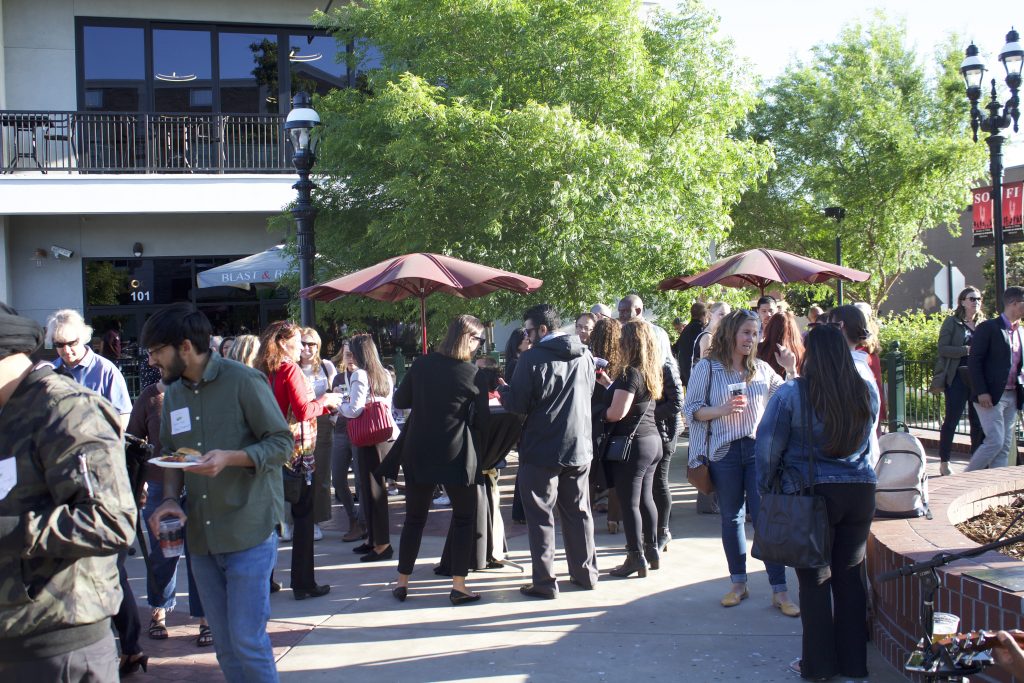
After being delayed due to COVID-19, the annual San Joaquin Valley Policy Conference returned this year to the Clovis Veterans Memorial District for the first time since 2019. Leaders from throughout the Central Valley will be attending from May 11-13.
The conference returned after a three year hiatus with a reception held in the downtown Clovis’ Centennial Plaza Wednesday, May 11th.
Last held in Lemoore, before COVID-19 halted the annual conference, Micheal Sigala, of the San Joaquin Valley regional planning agency, said that they needed a site for the conference and Clovis was worth a try.
“The City of Clovis is a great place to do business and have events that have the facilities,” Sigala said, “It was a no-brainer when we put together that we could have activities in Old Town.”
From May 11-13 the conference will hold guided tours of Clovis’ cottage homes, trail system, and affordable housing, according to their tentative agenda.
The theme for this year’s conference was “The Road Ahead” which is meant to provide “an opportunity for the Valley to come together to discuss what is up and coming in the region, with a special emphasis on transportation and housing,” according to the San Joaquin Valley Regional planning agencies policy council website.
Sigala said that the focus of the conference is to help educate each other.
“There’s so many new laws and funding sources coming down from both the state and federal governments. So it’s an opportunity to learn about new things in those areas and to reconnect with people that we lost connection with during the pandemic,” Sigala said.
According to Robert L. Poythress, Madera County Supervisor for District three, this conference directly impacts residents of Clovis because the conference is seeking to find “better ways, and more convenient ways,” to maintain roads, relieve congestion, and provide more venues and opportunities for travel along with providing a chance to discuss issues impacting transportation.
Issues such as a variety of mandates and regulations that have been “dictated” by California State Transportation Agency through executive orders according to Poythress.
“The good news is that we do have a lot of great projects that are going on, not only to finish Highway 99, but also multimodal projects to connect to 99,” Poythress said.
Poythress said a common misconception discovered through their research, is that the “average citizen” is unaware of the sources used to fund road repairs and maintenance is derived “mainly” from the gas tax.
“There might be a big chunk of money in the general fund, but that’s for the police and public works and other things. Not so much for road repairs so there isn’t the money out there that people would think for road repairs,” Poythress said.
With more consumers making the switch to electric vehicles as gas prices continue to rise, Poythres said that fewer people will continue to buy gas, and will trigger the search for a new substitute for the gas tax, which will have to start in order to maintain funds for road maintenance.
Poythress said that while he doesn’t think the conversation will be brought up much during the conference, the search for a gas tax substitute is something he’s passionate about.
Alternatives such as an idea of using a GPS form of distance-tracking to monitor and charge based on the distance traveled when using electricity.
“We’re looking at alternative sources to charge people for the number of miles that they drive kind of like what they do when they buy gas at the pump,” Poythress said “We’re going looking at alternative forms so that it’s a fair thing so people that still have gas cars aren’t bearing the burden for the people that have electric cars.”
The conference will continue through Friday the 13th.








